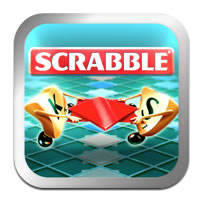Scrabble – iPhone App of the Week

This is a regular feature of the blog looking at the various iPhone Apps available. Some of the apps will be useful for those involved in learning technologies, others will be useful in improving the way in which you work, whilst a few will be just plain fun! Some will be free, others will cost a little and one or two will be what some will think is quite expensive. Though called iPhone App of the Week, most of these apps will also work on the iPod touch.
This week’s App is Scrabble.
Scrabble spells major F-U-N on your iPhone! Experience the realistic look and feel of Europe’s favorite board game.
£2.99

I recently discussed gaming and learning with Ron Mitchell and Kev Hickey in one of our podcasts.
Last week saw the Game Based Learning Conference, we didn’t go, but that didn’t stop us from talking about using games for learning and using gaming devices to enhance and enrich the learning process.
At the end of the recording we asked what was our favourite games, Scrabble came up twice!
Scrabble is a word game in which players get points for playing words on a board in a similar manner to a crossword.
Research from various universities has demonstrated that if learners play word and number games this can improve their literacy and numeracy skills. AS reported by The Telegraph:
Scrabble is just as good at improving mental sharpness as a Nintendo DS video games console and a copy of Dr Kawashima’s Brain Training, say researchers from the University of Rennes, Brittany.
Just on that article and research I have to admit I have always found it much easier to get 17 year olds to play games on the Nintendo DSi than I have getting them to play Scrabble!
Having said that I have “caught” learners in our Library playing Scrabble on the computers. I didn’t know if I should throw them off or congratulate them.
Scrabble requires players to use both word and number skills to maximise the points they earn, so has as demonstrated by the research to improve literacy and numeracy.
Scrabble on the iPhone can be played solo or with other players over wifi.
I quite like playing the game, even if the iPhone cheats and uses words that a) no one has ever heard of and b) no one would ever use!
When waiting for a train, or on a train, or to pass a few minutes away, Scrabble is a nicely executed iPhone game.





